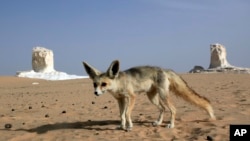Land degradation, such as a spread of deserts in parts of Africa, costs the world economy trillions of dollars a year and may drive tens of millions of people from their homes, a U.N.-backed study said on Tuesday.
Worldwide, about 52 percent of farmland is already damaged, according to the report by The Economics of Land Degradation (ELD), compiled by 30 research groups around the world.
It estimated that land degradation worldwide cost between $6.3 trillion and $10.6 trillion a year in lost benefits such as production of food, timber, medicines, fresh water, cycling of nutrients or absorption of greenhouse gases.
"One third of the world is vulnerable to land degradation; one third of Africa is threatened by desertification," it said.
Such degradation, including from clearance of tropical forests, pollution and over-grazing "can also lead to transboundary migration, and eventually create regional conflicts", it said.
The report cited a 2012 U.N. finding that up to 50 million people could be forced to seek new homes and livelihoods within a decade because of desertification.
"Increased land degradation is also one of the factors that can lead to migration and it is being exacerbated by climate change," European Environment Commissioner Karmenu Vella said in a statement about the report.
Zafar Adeel, director of the U.N. University's Institute for Water, Environment and Health which contributed to the ELD report, told Reuters that it was hard to pin down exact reasons for migration, for instance refugees fleeing Syria for Europe.
"We now have multiple factors - social, conflict - as in the case of Syria," he said.
In May, a study in the U.S. journal Proceedings of the National Academy of Sciences highlighted the link between drought, man-made climate change and conflict in Syria.
"Human-induced climate change made a multi-year drought the most severe in the observed record," Colin Kelley of the University of California, Santa Barbara, who led that Syria study, told Reuters.
"The severity of this drought started a cascade of events, namely an agricultural collapse, a mass migration of farming families to the cities in Syria’s west, and ultimately conflict," he said.
Much of the estimated lost trillions of dollars from land degradation in Tuesday's study falls outside conventional measures of gross domestic product — such as "free" pollination by insects or water purification by forests.
"We need to take a much broader approach to managing the planet" including a price on natural services, Robert Costanza, an author at the Australian National University, told Reuters.





